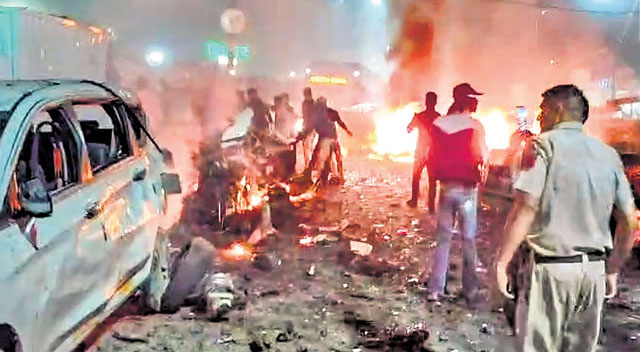Daijiworld Media Network - New Delhi
New Delhi, Nov 22: India’s investigation into the November 10 Red Fort bombing has exposed a sophisticated ‘white-collar’ terror module linked directly to Pakistan-based groups Jaish-e-Mohammad (JeM) and Ansar Ghazwat-ul-Hind, an Al Qaeda affiliate. The attack, which killed fifteen people, came just days after Jammu and Kashmir Police uncovered a highly organized terror network operating far from the traditional image of militants, with operatives including doctors and college professionals.
The Delhi module’s leaders were found to be in active communication with Pakistan and Turkey-based handlers connected to JeM chief Masood Azhar. Indian security agencies assert that the network was radicalised digitally, guided remotely, and shielded by Pakistan’s military establishment. Analysts note that this represents a shift towards embedding terror operatives in mainstream society—educated, professionally accomplished individuals ideologically recruited rather than preying on the economically vulnerable.

The revelations follow Operation Sindoor in May, when India carried out cross-border strikes on terror infrastructures in Pakistan and Pakistan-occupied Kashmir, including JeM’s headquarters in Bahawalpur. The presence of senior Pakistani military and civilian officials at funerals for killed JeM operatives highlights Islamabad’s continued selective patronage of jihadist groups.
Experts say Pakistan has long used terrorism as a key instrument of regional policy, supporting groups like JeM, Lashkar-e-Taiba, and Hizbul Mujahideen, often under the guise of charities, madrasas, or social welfare organisations. Under current Army Chief Field Marshal Asim Munir, Pakistan has consolidated military authority while continuing to nurture these proxies, viewing them as cost-effective instruments of statecraft against India.
The Delhi module’s exposure underscores the sophistication and global connectivity of Pakistan’s terrorist ecosystem, which continues to adapt and thrive despite international scrutiny. Analysts warn that the international community must reassess Pakistan’s role in regional security, as its military-backed terror infrastructure remains active, strategically deployed, and shielded from accountability.
This investigation is not just an Indian law-and-order issue but a stark reminder that Pakistan’s terror machinery, protected by the state, remains a persistent threat to regional stability.